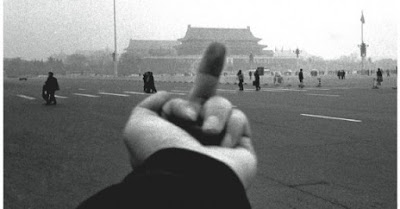Reading China through "Dictator's handbook"
 |
| Ai Weiwei doing what needs doing, even if it is futile |
Can China exist as a democracy? Is it even possible? If it can't sustain as a democracy, what makes the single party factory-of-the-world system so special to ensure evolution rather than revolutions? Perhaps the 'dictator's handbook' can answer that question better.
Today I was listening to the podcast "Intelligence squared", as I do with every evening walk from my office to home. The motion was that democracy perhaps is not suited for China. I thought that debate is preposterous - say that to an Uighur peasant or a miner dying of lung cancer or an indentured labourer at any of the big electronic companies. He/she will tell you the answer.
What I was most interested by was the recurring rhetoric about the economic miracle of China, that this kind of economic growth is unprecedented. That it single-handedly brought 70% of world's out-of-poverty transformations.
So on the one hand of the debate, there was this sweeping generalisation - economic prosperity is the definitive proof of a system's success. On the other hand, the debater pointed out how this makes the system vulnerable, ripe for a revolution. She gave the example of the Tunisian fruit seller whose immolation sparked Arab Spring. And this is where I remembered the Dictator's handbook. The book tells us that the Arab Spring took place because it was allowed to take place by the disgruntled elite who stood to benefit with the change in regime. Not because of the 'revolution' per se.
And so if we look at China and its around ~150,000 mutinies per year that haven't made a dent in the system, the reading tells us that China is under no threat of revolution right now. It is safe until it benefits the regional politicians, military and the elite 400 families who control most businesses. So until they are prospering, why would they let the communist party come under duress?
The question is how long will this party go on? China's economy is based on extraction of resources and labour and externalising private costs to public (through pollution, coercion, plundering public places etc) They have succeeded in moving up the value chain better than India, but not by much. They have indigenous technologies but nothing on the scale of California. Can a google/ Uber come out of China ever? I doubt. They have local hegemony, but outside, China can only hegemonise resources, not cultures or technologies (unlike US or potentially India). Resources unfortunately are limited. So that puts a limit to China's hegemony as it runs aground US/ european hegemonies. Open conflagrations help no one, so it creates a natural limit.
The trade surplus, if used strategically, can help them solidify their advantage, a moat around their advantages of sorts. They can take this opportunity of trade imbalance to create favourable rules and infrastructure of international trade. To an extent they are already doing that with infrastructure projects across the developing world and financial leverage with anyone desperate enough. China that way is definitely smarter than most nations.
Will this advantage hold? Will the system always have enough treasures in its coffers to pay off the influentials and essentials?
In the near future, definitely yes - it is doing all the right things economically. And it has the means to crush any internal 'revolution'. unfortunately. In the foreseeable future, yes again. Like US turned dollar into the default language of international trade, China will solidify its centrality in the global economic system.
In comparison to China, Indian masses are emaciated, hollowed out and broken people who are forced to live from one false dream to another. So it is easy to control and easy to not let them organise. But China's masses are becoming comparatively better off. They have tasted money and education. They will be ready to fight when the situation gets shitty. Here again, China has demonstrated its ability to concede small grounds to its people if status quo can be maintained. They are mighty paranoid to keep their status quo. And that paranoia helps them sustain.
What about next two-thirty years? who knows? first, climate change and resource depletion will fundamentally change the world power dynamic by then. Who does what to control resources such as water, food and how they distribute it to their people would be key. With the current levels of pollution acceleration, situation is going to get dire pretty quick. Food, water access will be a problem, both in India and China. Both might then see tribal fights among its citizens to gain access. End of nations, perhaps.
who knows.

Comments